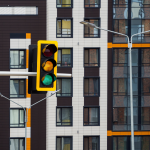Kaunas following in the footsteps of Vilnius – active construction and purchase of new apartments
 The start of 2017 in the Lithuanian residential market can be characterised by a steady growth. Nearly all the main indicators show that the market in the major cities of the country remains particularly active. In addition to the most active market of Vilnius region, after a longer break, the market in Kaunas is showing high activity levels. The volume of sales and supply of new apartments in Kaunas has finally reached the stage of faster growth.
The start of 2017 in the Lithuanian residential market can be characterised by a steady growth. Nearly all the main indicators show that the market in the major cities of the country remains particularly active. In addition to the most active market of Vilnius region, after a longer break, the market in Kaunas is showing high activity levels. The volume of sales and supply of new apartments in Kaunas has finally reached the stage of faster growth.
According to the State Enterprise Centre of Registers, in Q1 2017, 9% more purchase and sale transactions of houses and apartments were concluded in Lithuania than in the same period in 2016. In Q1 2017, an average of 680 transactions for houses and 2,590 transactions for apartments were concluded per month in Lithuania. Since 2007, only Q1 2014 saw better results. The number of transactions of apartments was 5% smaller than in the same period in 2014, but the number of transactions of houses was the same as in 2014. In Q1 2017, different activity trends were recorded in the residential market of major cities of the country. The largest change in the number of transactions of apartments was recorded in Klaipėda (the number of transactions increased by 15% compared to Q1 2016) and the smallest change was recorded in Panevėžys (the same number of apartments was purchased as in 2016). The number of transactions of houses grew fastest in Klaipėda and Klaipėda District (57% compared to Q1 2016), while in Šiauliai and Panevėžys cities and districts a drop of 4% and 6% respectively in the number of transactions of houses was recorded.
The continuing construction of new apartments in the country’s capital and the recovering market of new apartments in the city of Kaunas offer new options for customers. It is therefore not surprising that under favourable purchase conditions and liberal supply, in the five major cities of Lithuania ever increasing overall sales volumes of new apartments have been recorded. According to Ober-Haus, in Q1 2017, 1,462 apartments in completed apartment buildings and apartment buildings in progress were sold or reserved directly from developers in the major cities. It is 13% more than in Q4 2016 and 9% more than the number of apartments realised in Q1 2016.
The sales volumes of new apartments in Kaunas have seen new heights this year. In the first three months of 2017, 201 apartments in completed apartment buildings and apartment buildings in progress were sold or reserved in Kaunas (38% more than the number of apartments realised in Q4 2016 and 51% more than the number of apartments realised in Q1 2016). This is the largest sales volume of new apartments in the post-crisis period in the city of Kaunas and its environs. The growing activity of home buyers throughout the country, including Kaunas (the number of new and old apartments sold in the city of Kaunas in 2016-2017 was only 5–10% smaller than that in 2005–2007) and the increasing price levels encourage developers not to miss the opportunity and offer modern housing to sufficiently active market in Kaunas.
As a result, a leap in the supply of new apartments in Kaunas and its environs is expected in 2017. In total, 15–20 projects (or their stages) could be completed this year offering 600–800 new apartments. This is 2–2.5 times more than the number of apartments built in 2016 (311 new apartments). The sales results of 2016 and in particular of Q1 2017 show that new projects, it seems, will have no greater problems in finding buyers.
Cautious developer steps in the Klaipėda real estate market
Although more modest performance was recorded in the new apartment market in Klaipėda than in Vilnius or Kaunas, considering the size of the population the situation may be described as moderately optimistic. Even though the port city cannot boast of the amount of the projects, this is the second consecutive year that the projected number of apartments is on the rise. In total, 8–9 projects (or their stages) could be completed this year offering 250–300 new apartments. This is 25–50% more than the number of apartments built in 2016 (over 200 new apartments). While developers are still cautious about the more vigorous development of new apartments (in particular the larger scale projects, when a larger number of apartments is offered), the current market situation creates sufficient premises for the implementation of small- or medium-scale projects. The overall activity of buyers in Klaipėda (both for old and new apartments) is an indication of the existing internal potential and opportunities for new investment in the city. The apartment market in the city of Klaipėda has always been most active among the major cities of the country in terms of the relative number of apartment transactions per citizen leaving the city of Vilnius behind. In Q1 2017, 117 apartments in completed apartment buildings and apartment buildings in progress were purchased or reserved in Klaipėda (30% more than the number of apartments realised in Q4 2016 and 56% more than the number of apartments realised in Q1 2016).
Meanwhile in Vilnius, the figure for the sale of new apartments is ten times higher than that in Klaipėda – during the first three months of this year 1,138 apartments in completed apartment buildings and apartment buildings in progress were sold or reserved. This is 8% more than the number of apartments realised in Q4 2016 and 1% more than the number of apartments realised in Q1 2016. Such results were anticipated, because each year the scale of construction noticeably increases and the growth in supply contributes to the growth of demand. Ober-Haus forecasts 20% growth in supply of new apartments in the capital city in 2017, i.e. up to 4,500 new apartments will be built. The figure for the new apartments for sale was higher only in 2006–2008 (4,800–5,800 new apartments per year). A total of 75% of the apartments sold/reserved in Q1 2017 were in newly developed projects (i.e. projects or their stages due to be completed in 2017–2018).
Decrease in the number of unsold apartments for the fifth consecutive quarter
High levels of apartment realisation in Vilnius, Kaunas and Klaipėda determined a decline in the number of unsold apartments in these cities. This is the fifth consecutive quarter that this trends has been recorded. At the end of Q1 2017, the number of unsold new apartments in the major cities of Lithuania totalled 1,652 or 6% less than at the end of 2016 and 27% less than a year ago. The number of unsold apartments in Vilnius totals 929, in Kaunas – 236, in Klaipėda – 469, and 18 new apartments in Šiauliai and Panevėžys together.
The trends in the holding prices remain sufficiently clear and should not change at least in the short term. Despite the demographic challenges in the country’s regions, positive economic indicators of the country have been recorded. Favourable conditions for the purchase of homes further stimulate the markets of major cities where a moderate increase in prices was recorded. In Q1 2017, prices of apartments in Vilnius increased on average 1.3%, in Kaunas – 1.0%, in Klaipėda – 0.6%, in Šiauliai – 0.9% and in Panevėžys – 0.7%. Rising prices should not come as a surprise because of the continuing rapid increase in the role of the mortgage lending market, which reflects the growing confidence of the population in their financial wellbeing and in the general economic prospects of the country. According to the data of the Bank of Lithuania, in Q1 2017 new mortgage loans totalling EUR 261 million were provided, which is 27% more than during the same period in 2016. Thus, in view of the positive immediate outlook of the country’s economic development, the residential market looks optimistic at least in three of the largest cities of the country.
Latest news
 All news
All news

“e-market city” completes its second phase – the development of a modern “stock office” type shopping town continues
"e-market city", an online and wholesale shopping town located in a business-friendly location at the intersection of Eišiškių pl. and Geologų Street, is rapidly approaching the end of its second phase. The final construction works are currently underway and the first tenants of the new phase are preparing to move in as early as June-July. "The predominant floor areas of e-market city - ranging from 370 to 960 m² - are easily combinable and adaptable to a wide range of commercial activities. Existing and potential tenants appreciate the easy accessibility, high quality of construction and fitting-out, functional layout and solid neighbourhood, where well-known companies such as Assa Abloy, Dextera, Skuba, Skuba, Maidina, Šildymas plius, YE International, etc. are already located. The first phase is already 100% leased, while the second phase is still available - we invite you to get in touch", says Remigijus Valickas, Commercial Real Estate Projects Manager at Ober-Haus. The project is being developed in three phases on an area of 3.9 ha. The total area of the buildings will exceed 20,000 m² and the total investment in the project will amount to more than EUR 25 million. For more information about the project and leasing opportunities,…

The recovery of a very strong-looking housing market may slow down
The Ober-Haus Lithuanian apartment price index (OHBI), which follows changes in apartment sale prices in the five biggest Lithuanian cities (Vilnius, Kaunas, Klaipėda, Šiauliai and Panevėžys) increased by 0.5% in March 2025. The annual apartment price growth in the biggest cities of Lithuania was 4.3% (a 4.1% increase was recorded in February 2025). In March 2025 apartment prices in Vilnius, Kaunas, Šiauliai and Panevėžys increased by 0.4%, 1.3%, 0.4% and 0.2%, respectively, with the average price per square meter reaching EUR 2,680 (+10 EUR/sqm), EUR 1,846 (+24 EUR/sqm), EUR 1,172 (+4 EUR/sqm) and EUR 1,149 (+2 EUR/sqm). In the same month, apartment prices in Klaipėda decreased by 0.1% and the average price per square meter dropped to EUR 1,752 (-2 Eur/sqm). In the past 12 months, the prices of apartments increased in all the biggest cities in the country: 3.3% in Vilnius, 5.6% in Kaunas, 5.4% in Klaipėda, 6.5% in Šiauliai and 6.4% in Panevėžys. "At the beginning of 2025, the country's housing market is showing impressive results. After a very strong growth in housing transactions in January and February this year, the increase in the number of transactions continued in March. According to the data of the State Enterprise…

Housing market has woken up, but no faster price growth yet
The Ober-Haus Lithuanian apartment price index (OHBI), which follows changes in apartment sale prices in the five biggest Lithuanian cities (Vilnius, Kaunas, Klaipėda, Šiauliai and Panevėžys) increased by 0.4% in February 2025. The annual apartment price growth in the biggest cities of Lithuania was 4.1% (a 4.0% increase was recorded in January 2025). In February 2025 apartment prices in Vilnius, Kaunas, Klaipėda, Šiauliai and Panevėžys increased by 0.3%, 0.1%, 0.8%, 0.8% and 0.9%, respectively, with the average price per square meter reaching EUR 2,670 (+7 EUR/sqm), EUR 1,822 (+2 EUR/sqm), EUR 1,754 (+13 EUR/sqm), EUR 1,168 (+10 EUR/sqm) and EUR 1,147 (+10 EUR/sqm). In the past 12 months, the prices of apartments increased in all the biggest cities in the country: 3.2% in Vilnius, 4.1% in Kaunas, 6.2% in Klaipėda, 6.6% in Šiauliai and 6.7% in Panevėžys. ‘As predicted, a rapid annual growth in the number of housing transactions is recorded at the beginning of 2025. According to the data of the State Enterprise Centre of Registers, 40% more apartments were purchased in the country in January this year and 39% more in February this year than in the same month in 2024. It should be noted that in the…
 All news
All news


